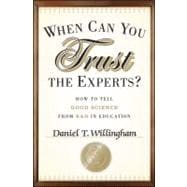
Note: Supplemental materials are not guaranteed with Rental or Used book purchases.
Purchase Benefits
What is included with this book?
| About the Author | p. xi |
| Acknowledgments | p. xii |
| Introduction: What Are You to Believe? | p. 1 |
| Why We So Easily Believe Bad Science | |
| Why Smart People Believe Dumb Things | p. 31 |
| Science and Belief: A Nervous Romance | p. 57 |
| What Scientists Call Good Science | p. 81 |
| How to Use Science | p. 107 |
| The Shortcut Solution | |
| Step One: Strip It and Flip It | p. 135 |
| Step Two: Trace It | p. 167 |
| Step Three: Analyze It | p. 183 |
| Step Four: Should I Do It? | p. 207 |
| Endnotes | p. 223 |
| Name Index | p. 237 |
| Subject Index | p. 243 |
| Table of Contents provided by Ingram. All Rights Reserved. |
The New copy of this book will include any supplemental materials advertised. Please check the title of the book to determine if it should include any access cards, study guides, lab manuals, CDs, etc.
The Used, Rental and eBook copies of this book are not guaranteed to include any supplemental materials. Typically, only the book itself is included. This is true even if the title states it includes any access cards, study guides, lab manuals, CDs, etc.